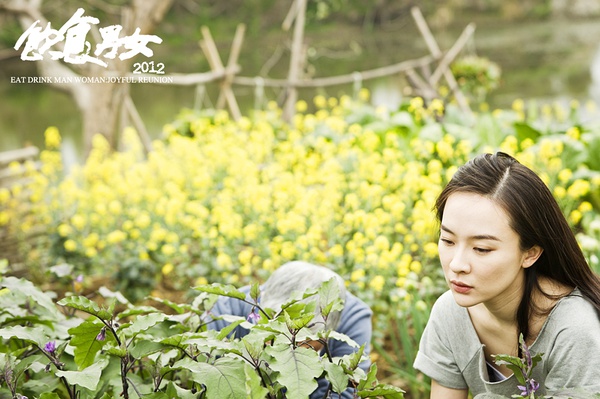Review: Joyful Reunion
 0 Comment(s)
0 Comment(s) Print
Print E-mail Film Business Asia, February 29, 2012
E-mail Film Business Asia, February 29, 2012

Story
Hangzhou, Zhejiang province, China, the present day. Master chef Tang Shizhe (Kenneth Tsang) tells his two daughters, the careerist Wa'er (Huo Siyan) and teenage Xiaolan (Jiang Mengjie), that he has decided to sell his upscale vegetarian restaurant, the centre of his life for 30 years. Wa'er manages a luxury health resort and is dating Chang Chuan (Blue Lan), a computer-games designer from Taiwan. Chang Chuan goes to Taipei to visit his aunt, Pai Ping (Rose Kuei), who effectively raised him, and she ends up accompanying him back to Hangzhou, where she originally grew up but hasn't re-visited since leaving for Taiwan in her teens. Pai Ping meets Wa'er but her forthrightness often proves embarrassing in the sophisticated circles Wa'er moves in. Pai Ping notices, however, that Bei Ming (Chang Hsiao-chuan), general manager of the luxury health-resort group, is also romancing Wa'er, who feels neglected by Chang Chuan in favour of his work. One day Pai Ping tells Wa'er her story - how she was born in Hunan province, moved when young to Hangzhou where she worked in the restaurant business, and finally moved to Taiwan - and the two women bond. When Shizhe reveals the real reason for selling his restaurant, Wa'er resigns from her job to help him out and be with him. Meanwhile, Shizhe, who has not yet met Pai Ping, decides to cook a special meal to welcome her.
Review
Though Eat Drink Man Woman (1994) spawned several imitation, cookery-themed movies over the years — such as Daniel Li's Four Chefs and a Feast (1999), which even included two of the original cast, Sihung Lung and Jacklyn Wu — Joyful Reunion is the official "sequel", 18 years after Ang Lee's hit and with its producer, Hsu Li-kong, now 68, still at the wheel. In fact, it isn't a sequel at all, more a bouillabaisse of some of the same elements (mixing food and human relationships) and lightly garnished (as per its English title) with a reunification message.
The screenplay, by an army of six writers and two "script co-ordinators", keeps the rom-com elements lightly ticking over but doesn't reach down very far to integrate the human and food sides in the same way as Ang Lee's original movie. For a start, the film is an extended plug for vegetarianism — which doubtless helped it secure a world premiere slot in the Berlin Film Festival's Culinary Cinema sidebar, supervised by vegetarian Berlinale boss Dieter Kosslick. It's also not fully convincing on the culinary side: did vegetarian fusion cooking (a main plot point) really exist in Hangzhou in the late '40s? Added to which, the screenplay is also very episodic and structurally shaky: the key meeting between two of the protagonists is artificially delayed to provide a resolution that the audience is already way ahead of.
With its setting largely in China rather than on Taiwan — as a reflection of present-day realities — the movie works best as an amusing, though not particularly original, light comedy, dominated by the performance of Taiwan veteran Rose Kuei (aka Kuei Ya-lei, Ah-leh Gua, Ahleh Chang, among many others). When the 67-year-old actress, who had a supporting role in Ang Lee's film, is on the screen, the film bubbles like a hotpot and earns an extra point. In early scenes she has fun as a straight-talking, trashy Taiwanese returning to the Mainland for the first time in half-a-century — to be met by a New China of luxury health resorts, culinary snobbery, large disposable incomes and lifestyle sophistication. In later scenes Kuei moves from clowning to nostalgia — accompanied by Baby-C's soupy score — with equal skill, as well as displaying impressive form on the dance floor.
In the de facto Sihung Lung role as a veteran master chef, Hong Kong's Kenneth Tsang brings a quiet dignity to the movie, as well as sharing some nice moments of nostalgia with Ting Chiang as his head chef-cum-friend. Other performances are okay but don't leave much emotional trace: Mainland actress Huo Siyan (Distant Thunder (2010), The Island (2010)) as Wa'er, the careerist manager of a health resort; Taiwan's Blue Lan (Night Market Hero) less believable as her computer-geek boyfriend; and China's Jiang Mengjie (Lin Daiyu in the Li Shaohong-directed TV drama The Dream of Red Mansions, 2010) okay in the under-developed role of Wa'er's pouty younger sister. Journeyman Tsao Jui-yuan (Love's Lone Flower (2005)) directs smoothly enough, helped by good-looking but not succulent photography by fellow Taiwanese Chin Ting-chang (Night Market Hero, Warriors of the Rainbow: Seediq Bale).
The Chinese title literally means Drink Eat, Man Woman: So Far and So Near, another reference to re-unification.






Go to Forum >>0 Comment(s)